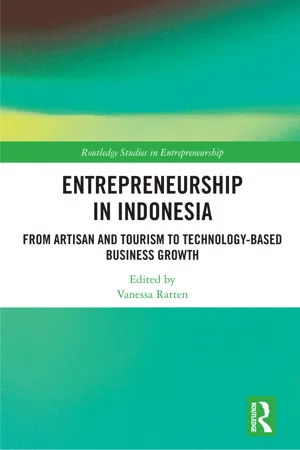
Entrepreneurship in Indonesia
From Artisan and Tourism to Technology-based Business Growth
- 160 pages
- English
- ePUB (mobile friendly)
- Available on iOS & Android
Entrepreneurship in Indonesia
From Artisan and Tourism to Technology-based Business Growth
About this book
Whilst other countries in Asia particularly China and India have been studied in terms of entrepreneurial endeavours, there is a lack of research on Indonesia despite it being amongst the fastest growing economies in the world. Indonesia is also one of the largest recipients of venture capital in Asia. This book looks at the growth of entrepreneurship in Indonesia from artisan and cultural endeavours to an increased awareness of digital and technology-based forms of entrepreneurship.
The book examines the distinct cultural heritage of people in Indonesia towards entrepreneurial pursuits and analyses the role family and minority businesses play in the development of entrepreneurial capabilities. It stresses the need to focus on more categories of entrepreneurship in Indonesia such as artisan, tourism and sustainability in order to facilitate the growth of digital-based startups.
This book will be amongst the first to explore how Indonesia is leaping ahead of competitors in its quest to be a dominant world power through its entrepreneurial pursuits.
Frequently asked questions
- Essential is ideal for learners and professionals who enjoy exploring a wide range of subjects. Access the Essential Library with 800,000+ trusted titles and best-sellers across business, personal growth, and the humanities. Includes unlimited reading time and Standard Read Aloud voice.
- Complete: Perfect for advanced learners and researchers needing full, unrestricted access. Unlock 1.4M+ books across hundreds of subjects, including academic and specialized titles. The Complete Plan also includes advanced features like Premium Read Aloud and Research Assistant.
Please note we cannot support devices running on iOS 13 and Android 7 or earlier. Learn more about using the app.
Information
1 Indonesian entrepreneurship
Origins, conceptualisation and practice
Introduction
Indonesia
Entrepreneurship
Table of contents
- Cover
- Half Title
- Series Page
- Title Page
- Copyright Page
- Table of Contents
- List of Tables
- List of Figures
- Acknowledgements
- List of Contributors
- 1 Indonesian entrepreneurship: origins, conceptualisation and practice
- 2 Artisan entrepreneurship in Indonesia
- 3 Food artisan entrepreneurship in Indonesia
- 4 Knowledge management and artisan entrepreneurship in Indonesia
- 5 Indonesian migrant entrepreneurs: a comparison of two cohorts in Malaysia
- 6 Technology entrepreneurship in Indonesia
- 7 Cross-sectional study (period 2013-2016) of the factors that identify entrepreneurship in Indonesia
- 8 Rural entrepreneurship and social innovation in Indonesia
- 9 Indonesian entrepreneurship: Future directions
- Index